
All categories
Featured selections
Trade Assurance
Buyer Central
Help Center
Get the app
Become a supplier

(16074 products available)


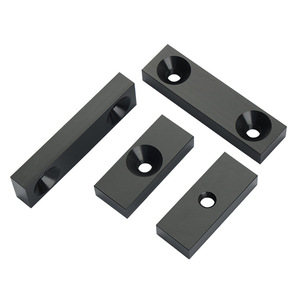













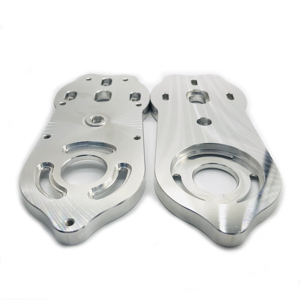
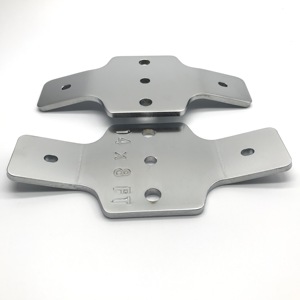










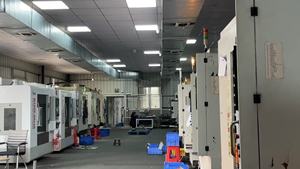

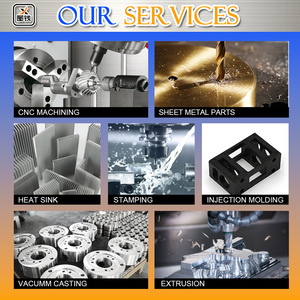

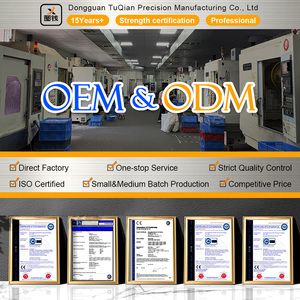












The materials used for small-order CNC parts are chosen based on durability, strength, and density. Often, CNC parts are made from the following materials:
Aluminum
Within the fabrication of cnc machined parts, aluminum is popularly used because it is lightweight and has good workability. Aluminum is corrosion resistant and is often used in transportation, aerospace, and auto parts. Aluminum alloys, like 6061 and 6062, are often used for CNC machining because they exhibit good balancing of toughness and malleability.
Stainless Steel
With excellent resistance to corrosion and heat, stainless steel is a popular material for small-order CNC parts. Common grades, such as 304 and 316, are often used in medical devices, chemical processing, and marine applications because of their durability and aesthetic properties. Stainless steel, known for its strength and ability to withstand harsh environments, is easily machined into complex parts.
Brass
When used for its machinability and anti-corrosive properties, brass, an alloy of copper and zinc, is commonly used for small CNC parts. Commonly utilized within electrical connectors, musical instruments, and plumbing components, brass offers an attractive finish and good workability. It, therefore, makes an excellent option for precision parts where resistance to corrosion is required.
Plastic
Plastics, including acrylic, nylon, and polycarbonate, are often used for CNC machining parts because of their low density and high chemical resistance. Plastics, frequently used in the automotive, electronic, and medical industries, provide electrical insulation and tolerance to varying degrees of heat. Plastics, besides offering a cost-effective solution for prototype development, also offer a versatile medium for parts fabrication.
Titanium
Very strong yet lightweight, titanium is often used in CNC parts that are under severe stress. Commonly used within the aerospace, medical implants, and chemical processing industries, titanium has great resistance to corrosion and biocompatibility. Grade 5 titanium alloyed with aluminum and vanadium is machined to offer superior mechanical properties under challenging environments.
Small order CNC parts come with a variety of customization options to ensure their viability for specific applications. Such options include:
Material Selection
CNC machining small aluminum parts offer vast material choices, from metals like aluminum and stainless steel to plastics and composites. Each material’s properties, such as durability, weight, and corrosion resistance, are tailored for CNC machined components depending on the nature of the project. Small order CNC parts provide flexibility in selecting materials that best meet the functional and aesthetic requirements of the client.
Dimensional Tolerances
Tight dimensional tolerances are a main benefit of CNC machining. Clients specify the required precision levels, which are then machined to within a few micrometers. This high accuracy is necessary for industries such as aerospace and electronics, where even the smallest variance affects performance.
Surface Finishes
ac cnc machined parts can have various surface finish options like anodizing, powder coating, and polishing. Each finishing has a different influence on the part’s appearance and performance. For instance, anodizing offers enhanced corrosion resistance, while polishing gives a better aesthetic finish. Clients select a finish depending on functional needs and visual appeal.
Complex Geometries
CNC machining permits the production of highly complex geometries that are unattainable with conventional methods. High Order CNC parts can be customized into intricate designs, including tight grooves, slots, and varying thicknesses. Such design flexibility enables unique product development that satisfies specific application needs.
Assembly Requirements
Custody CNC parts are designed with specific assembly requirements in mind. Parts can have integrated features like slots and dowels for easier assembly within larger systems. Clients needing specific compatibility with other components also indicate such requirements, ensuring seamless integration during the assembly process in production.
CNC parts have diverse commercial applications and offer businesses accuracy, efficiency, and flexibility benefits. Some of this usage are as follows:
Prototyping and Product Development
CNC machine metal components are widely used in prototyping, allowing designers to create precise models of their products. This precision enables more accurate testing and validation of design concepts, reducing the time and cost associated with product development. Industries ranging from automotive to consumer electronics depend on small-order CNC parts to rapidly prototype machines and components, facilitating quicker market introductions.
Replacement Parts and Maintenance
Small-order CNC parts, manufactured on demand, take rare or obsolete replacement parts in industries like manufacturing and construction, where constant machine operation is required. Quick access to replacement components minimises downtime and maintenance costs and ensures machines and systems maintain optimal performance.
Customized Products
CNC machining allows businesses to customize products to specific customer preferences. From personalized engravings to bespoke mechanical components, small-order CNC parts enable a high level of product customization across industries, including jewelry, automotive, and electronics. This level of customization gives businesses an edge over competitors and fulfills the rising demand for unique products.
Electronic and Electrical Components
CNC parts are vital in electronic assemblies. These parts include brackets, housings, heat sinks, and other precision-engineered components that support the functioning and structural integrity of electronic devices. Industries such as telecommunications and computing require CNC parts, which ensure these components meet strict tolerance standards.
Aerospace and Defense
The aerospace and defence industries rely heavily on the precision and reliability of CNC parts. Components such as brackets, housings, and engine parts can be machined to tight tolerances, ensuring optimum performance and safety. Small-order CNC parts usual quick access helps these industries maintain stringent production schedules and an uninterrupted supply chain.
When choosing custom machining for small orders, buyers should consider various factors to ensure they procure quality products. Here are some key considerations:
Material Expertise
It's important for the parts supplier to have experience dealing with various materials, including metals, plastics, and composites. Each material has unique properties that may affect the part's functionality and suitability for end applications. Thus, buyers should ensure they choose suppliers who can deal with multiple materials and offer the necessary finish options.
Precision and Accuracy
Normally, CNC machining is popular for producing precise and accurate parts, as the machines can operate within tight tolerances. However, it is the buyer's responsibility to confirm the level of tolerance their preferred manufacturers can achieve. In this case, they may have to inquire about the machinery and software used in the manufacturing process. Moreover, they may have to request previous work samples to assess if they have the capability to work on required complex designs.
Turnaround Time
In most cases, lead times tend to vary based on the complexity of the project, the number of parts, and the workload of the manufacturer at a certain time. Therefore, buyers should give attention to clear communication in this case to avoid misunderstandings. They should also provide detailed information regarding the projects and any possible adjustments that may affect the schedule.
Further, if the customer requires the order for a certain bulk purchase or immediate use, they should consider working with manufacturers who have in stock the required materials and parts to ensure quick order fulfilment.
Cost and Budget
Normally, the cost of CNC machining service can vary based on materials, complexity, finishing, and quantity of the parts required. Therefore, when inquiring about costs, buyers should request detailed breakdown from their potential suppliers in order to make a fair price comparison. In cases where the overall cost is a major concern, buyers can negotiate various factors, like using a different material or slightly adjusting the complexity of the project.
Customization
Generally, one of the major benefits of CNC machining is the ability to customize the clients' machined parts as per their unique requirements. Therefore, while at the purchasing stage, buyers should ensure they areworking with manufacturers willing and able to provide them with custom solutions. They also should be specific about their requests, whether regarding design, finishing, or material.
Some of the main benefits of CNC machining for small parts are:
Customization plays a major role in CNC machining since it enables every client to get unique parts that meet particular project needs. Essentially, this level of flexibility ensures that businesses can get CNC parts tailored to their distinctive functional and aesthetic requirements. Here are a few reasons why customization is essential:
CNC parts can be made from various materials, each offering distinct advantages depending on the application. Here are some commonly used materials:
Aluminium
Aluminium is normally easy to machine, lightweight, and corrosion-resistant, making it ideal for diverse CNC parts. Its malleability allows complex designs to be incorporated easily. Further, aluminium is used in many applications, especially in aerospace, automotive, and electronics, due to its balance in strength and lightweight.
Stainless Steel
Commonly, available in various grades, including 304 and 316, stainless steel is highly corrosion-resistant, durable, and retardant to heat. Standardly, this material is popular in industries where hygiene and strength are very critical, such as in chemical processing, medical devices, and food manufacturing. There, it is valued for its toughness and long lifespan.
Brass
Brass, an alloy of copper and zinc, is widely utilized due to its excellent machinability and resistance to corrosion. Usually, it comes with a gold-like appearance; therefore, it is often used for decorative items. It also has electrical conductivity properties; hence, it is utilized in connectors and other electronic components. Normally, brass parts are fabricated with precision using CNC machining for various industrial applications, including plumbing fixtures and musical instruments.
Plastics
Plastics, like acrylic, nylon, and polycarbonate, are normally lightweight, cost-effective, and easy to machine. They have great resistance to chemicals and electrical conductivity. Hence, they are popularly used for CNC parts suitable for the automotive, medical, and electronic industries. Standardly, these materials enable creation of parts with smooth finishes and precise dimensions.
Titanium
Although titanium is more challenging to machine compared to other metals, its unmatched strength-to-weight ratio and exceptional corrosion resistance make it highly valuable. Biocompatibility properties offer durability and safety in medical implants. This quality and its use in aerospace components, under extreme environmental conditions, make it a premium choice for high-performance applications.